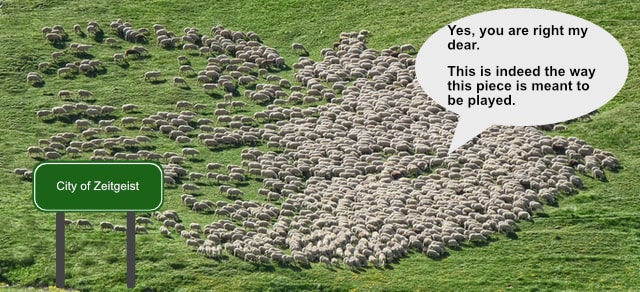Intro
Approval seeking was always (and will always be) a common predisposition to mammals like humans. Humans seek and crave approval from the others in order to simply carry through with their existence. Approval-seeking can be found in all of our personality traits, and in all of our everyday doings.
Together with this relentless craving of approval, we have taken to compare ourselves to the others, and thus, making our lives even harder than they already are. And all this laborious psychological endeavour leads to nothing less than constantly falling short in our expectations of ourselves. Great, isn’t it?
Oscar Wilde famously said, “Be yourself. Everyone else is taken”. Behind those two unassuming sentences hidden is the massive psychological world that we call self-acceptance. Self-acceptance is difficult to achieve for us pianists. Mind you, for those of us who tackle students, self-acceptance is paramount in our road to pedagogical excellence; if we haven’t accepted ourselves, how can we teach some fragile souls to accept their sound and art? How can we ultimately lead our pupils to accept themselves? So, self-acceptance must be one of our foremost priorities to mature both as teachers but also as performers.
I, Nikos Kokkinis, writer of this website, long so much for any external approval from my peers and from everybody else that I have gone to great extents to hide it. For instance, I rarely comment on social media and I do not write online about me or about any politically sensitive issues because I want to hide my ineptitude in so many aspects of the everyday life and in my art. However, I do not know why, but I do not crave the approval of my students—but, I am willing to learn more about why that happens.
I suspect that one of the key reasons I despise the notion of student-validation and approval is because I hate the ever-pleasant and voguish teachers. I hate the politically correct correctness of the smiley pedagogues, and I despise the teachers who reassure their students that everything is possible in life if they “really want it”. Really? Can a 75-year-old start violin lessons, become the next Heifetz and play a solo violin recital at Carnegie Hall? No. That’s my answer. But obviously I’m not pedagogically sufficient for some of my fashionable peers. For some, anyway.
Should You Seek Your Students’ Approval
Should you seek your students’ approval? My belief is that you shouldn’t, since seeking approval in music (and in life in general) can only lead to pedagogical failures:
Here’s some of the caveats of approval-seeking in the musical arena:
- Approval-seeking can disorientate our piano teaching process and result to undesirable pedagogical effects on our students’ progress; when we crave approval, we usually fall into the trap of constantly endorsing our students’ playing in order to make them like us, and so, our students, basically, do not progress. Here, honesty needs to come to play, and we must clearly tell our students when they play well and when they don’t. Students need to be able to trust themselves and they do not want teachers that cannot rate them precisely because, at the end of the day, students won’t be able to trust their own instincts if the teacher constantly does not mind whatever they play—Bear in mind, that students subconsciously always know when a teacher lies to them.
- Approval-seeking can lead us to agree in default with a decision made by a student after consulting voguish mentors (as you have noticed I like the word “voguish”)—Mentors can be the student’s relatives, coaches, teachers, friends or people that possess an accepted social status; we must stand strong and support our position, even if it is the least popular.
- Seeking validation from students is a dream for the voguish teacher (sorry) who quickly grabs the opportunity to become politically correct with whatever is currently in fashion; naturally, the voguish teacher will rapidly develop oversensitivity with things such as, repertoire, popular politicians, zeitgeisty solutions to save the earth, dietary choices and of course, my favourite, “tolerance”—tolerance, whatever that means, becomes a career-advancing tool for the voguish teacher, especially for whatever currently is… guess… in vogue. Later, of course, tolerance for the validation-craving pedagogue becomes a distant memory from a trip to a trendy nearby protest.
- Approval seeking can make you a weak partner in the music business because, well, partners want strong and clear-speaking partners. If you constantly agree with your peers in an effort to become likeable, then they will eventually consider you a weak “player”, someone whom on his services they cannot fall back on if things become harder.
- Pianistically, approval-seeking is a universal “decease” because you will make performing decisions according to what the others want and not according to your artistic views. You do not want to become a performing “sheep” following the zeitgeisty flock of an audience—yes, audiences are always, always zeitgeisty in music too, because they follow the spirit of their era (ok, you’re not). Notable exceptions that managed to escape from the claws of the horrid musical zeitgeist of their era were Vladimir Horowitz, Andras Schiff and Glenn Gould: those unassuming fellows made their fingers do the talking and, of course, you know what followed: total hypnotic performances that will arguably stand the test of time.
End
So, STOP IT—I know you crave your students’ validation. I do.
However, you wouldn’t want to become an approval-seeking zombie, per se, in life. Equally in music, approval-seeking is malign and can destroy your pedagogical and artistic integrity.
Ok, you’re free to unsubscribe.
Copyright © 1st of August 2020 by Nikos Kokkinis
===
You could fund this independent website today. Help its sharp musical voice to continue to be heard as it has done for the past decade by joining our membership. Membership gives you all our digital music for free.


